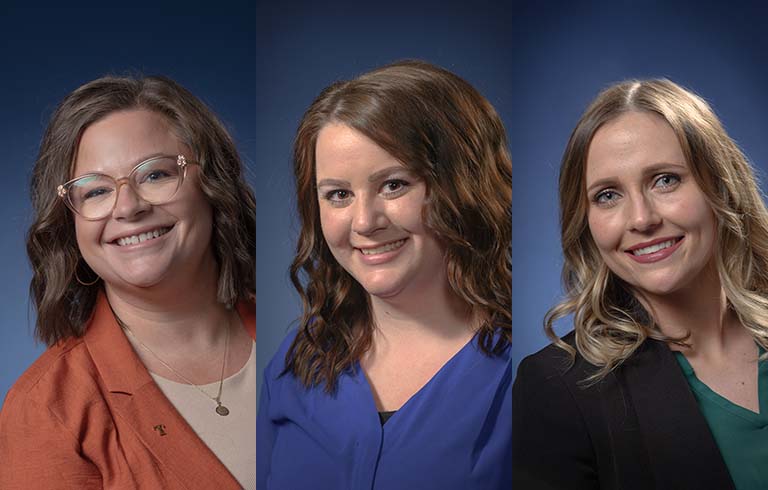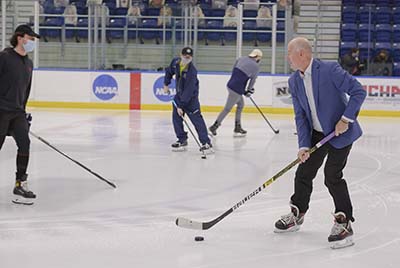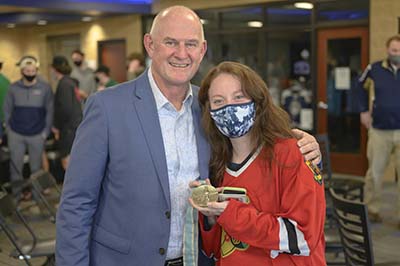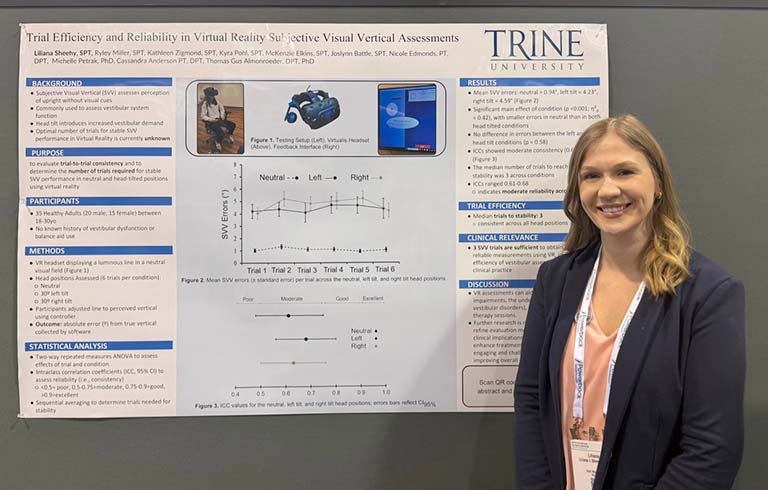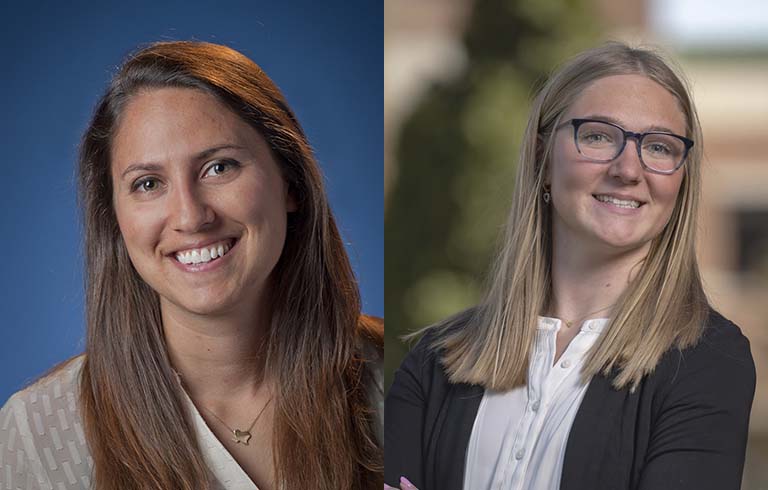It was the defining moment of hockey, if not of all sports, in the United States:
the 4-3 victory over the Soviet Union in the 1980 Olympics known as the “Miracle on
Ice.”
“When that event happened, people refer to it as we beat the Russians,” said Dave
Christian, a member of that U.S. Olympic team. “It wasn’t the US hockey team, it wasn’t
they, it was we.”
Part of a group from Cardinal Glass that visited Trine University on March 17, Christian
shared his memories and insights from his experiences on that team as well as in the
National Hockey League, and his work today as co-director of leadership development
at Cardinal.
Speaking to Trine hockey coaches and players in the lobby of the Thunder Ice Arena,
Christian said that as someone who “grew up in a small town in Minnesota, Warroad,
six miles from the Canadian border,” he was grateful for his experiences at the University
of North Dakota, the Olympics, the NHL and at Cardinal.
He discussed the leadership principles of U.S. Olympic coach Herb Brooks, whom he
said a friend described as “having the ability to know how to pack a lunch.”
“You can’t have all chips and you can’t have all candy and you can’t just have bread,”
Christian said. “You need all of the components to have a good, decent lunch. I think
that was his approach in putting a team together. His idea and thought was that you
don’t necessarily need the best players, but you need the right players.”
One example, he said, was Mike Eruzione, who served as team captain.
“He wasn’t the best player on that team, but he was the best person to bring that
group together, and therefore he was the best captain for that team,” Christian said.
Brooks’ leadership, Christian said, was about preparation as opposed to winning, resulting
in an extensive exhibition season prior to the Olympics and grueling workouts. When
players were cut from the team in the summer of 1979, Brooks warned those remaining
to, “take a look at those guys. They’re getting off easy.”
Christian said Brooks defined the goal and vision for the team from the beginning
by saying, “We may not be the best team when we get to Lake Placid in eight months,
but we will be the best conditioned team when we get to Lake Placid.”
Another principle he learned from Brooks was that “just because somebody may not be
a good fit for the current position that they’re in doesn’t mean they can’t be a valuable
member of your team.”
In fact, Christian made the U.S. team as a forward, but Brooks switched him to defense
two months before the Olympics after Christian had expressed concerns about struggling
to score.
“He responded immediately, ‘David, I don’t care if you ever score another goal for
this team. I don’t need you to score goals. I just need you to play,’ Christian said.
“It was certainly a relief and took all the pressure off having to produce.”
Christian described his NHL career as a “roller-coaster ride.” He joined the Winnipeg
Jets and scored seven seconds into his first game, setting an NHL record for fastest
goal by a player in his first game.
However, the Jets only won eight games that year. Christian said he “went from the
penthouse to the outhouse.”
Asked during a question-and-answer session what hockey players can do in the off-season
to perform their best on the ice, Christian said conditioning has changed a lot since
his playing days. He told those present it’s important to maintain their passion for
the game.
“There’s nothing better than playing hockey,” he said. “The locker room, on the ice,
on the bench with your teammates, nothing like that.
“And I think I’ve learned that you don’t necessarily find a new passion, you just
kind of move on from that passion. If you’d have asked me 10 years ago if I’d be co-director
of leadership development I would have said you’re crazy. I didn’t see myself in this
role. But I enjoy people, and it’s rewarding as can be to see people succeed and move
on in their leadership.”
Christian also was asked if the US team realized the magnitude of their victory at
the time. He noted that the US had been blown out 10-3 by the USSR two weeks prior,
and he said the mindset going in was “let’s not embarrass ourselves. Let’s make sure
we’re ready. Leave it all out on the ice.”
“For the players on the team it was an opportunity to play against, at that time,
the best team in the world,” he said. “We continue to be amazed of the magnitude of
that particular moment.”
After his presentation, Christian skated and shot on the Thunder Ice Arena rink with
Trine hockey players.
In addition to Christian, Mike Connell, plant manager for Cardinal IG in Fremont,
Indiana, Hillary Parsons, training coordinator at Cardinal IG in Fremont, Sharon Beaman,
co-director of leadership development for Cardinal Glass, and Alicia Hoover, co-director
of leadership development for Cardinal Glass, met with Trine University President
Earl D. Brooks II, Ph.D., and academic leadership at the University.
The day’s activities were part of a recently announced partnership that will provide
professional development and educational opportunities at Trine University for employees
at Cardinal IG.
Top photo: Dave Christian, a member of the 1980 US Olympic hockey team, prepares to speak to
Trine University hockey coaches and players on March 17. Christian jokingly referred
to his skates as his "security blanket." (Photos by Dean Orewiler)
